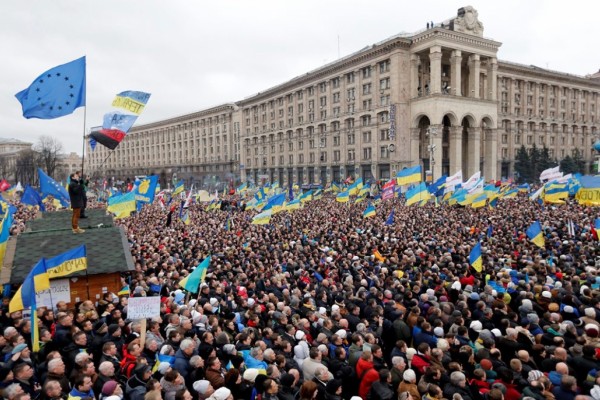Each week we bring you the ten most important pieces of news from Eastern Europe and the Western Balkans.
Compiled by: Hristo Voynov and Kristijan Fidanovski
1. The uneasy cohabitation between Moldova’s pro-EU government and its pro-Russian President Igor Dodon reached a new low after a decision by the Constitutional Court to initiate a suspension procedure against the president. Based on Dodon’s unjustified refusal to confirm the government’s nominee for minister of defence, this decision had been called for by the government for months.
2. Major protests occurred in Kiev this week, with controversial figure and former Georgian president Saakashvili and his supporters, among other groups, attempting to set up a camp outside of the Verkhovna Rada, the parliament building. The main message of these protests has been against corruption. Though Saakashvili vowed to remain peaceful, state security services were on alert and clashes were present. Exactly where these protests will go is uncertain. Corruption is a major problem in Ukraine, but the country’s political will may prove to be too weak from its war in the East. Just days before these protests started, another major show of force was seen in Kiev from the far right, which was celebrating the 75th anniversary of the Ukrainian Insurgent Army.
3. The ruling party in Macedonia, SDSM, took a landslide victory in the first round of local elections last weekend. With only few (largely minor) cities going into a second round of voting on October 29, the results were a major defeat for VMRO-DPMNE, which had ruled the country for almost eleven years before this summer. It remains to be seen whether its leader Nikola Gruevski, who has been indicted for various crimes totalling up to a possible 27 years in prison, will take responsibility and resign.
4. The Czech elections are set for this weekend on October 20th – 21st. They are expected to bring Andrej Babis with his populist ANO party into power but with roughly 25%, which would require them to form a coalition. If ANO performs as currently expected, it would receive no more than 70 seats in parliament with 101 needed for a majority. As many parties are running, the rest of the seats will be highly divided, so ANO may be forced to take on two partners as opposed to just one. This election may shift the balance of power within the EU further towards illiberal democracies and strongman politics, though Babis’ exact style of leadership is still to be tested.
5. Eight former executives of Croatian supermarket chain Agrokor have been detained and an arrest warrant for its founder and CEO Ivica Todorovic is expected to be issued soon. A personal friend of Croatian wartime leader Franjo Tudjman, Todorovic has become the symbol of the country’s dodgy privatisation in the 1990s and the finalization of Agrokor’s multiple affairs could be a major albeit belated transitional justice victory.
6. The Visegrad Group continues to speak louder when it comes to EU politics. The leaders of the four countries further backed the EU accession of the Western Balkans, though remaining skeptical of Bosnia because of the risk of radical Islam. There is differing opinions however on Ukraine, which Poland sees as a top priority while Hungary has been threatening to derail any accession efforts due to Ukraine’s recent language learning law. The Austrian election last weekend also saw the far right Freedom Party come into power, which presents it as a natural ally as the 5th of the V4 due to ideological similarities and geographical proximity to the bloc.
7. An opinion poll on the appreciation of EU membership in Croatia, Romania and Bulgaria has produced some disconcerting results. In all three countries, EU membership is supported by less than two thirds of the population, even though EU accession consistently enjoyed a two-third popular support during the accession process. With the numbers being the lowest (56%) in Bulgaria, whose accession has generated most criticism for its potentially political nature, this trend indicates some disappointing unwillingness on the part of the EU’s most recent member states to accept their membership responsibilities.
8. The debate over the CEU, or Central European University, continues. The Hungarian parliament extended the deadline for the university to comply with the new laws that were passed with the intent of forcing the university to spend massive amounts of money on new regulations or shut down. The extension to January 1st, 2019 gives the university more time to comply with regulations, though this has been criticized by the CEU as a step backwards that only prolongs the uncertainty surrounding the situation.
9. The International Court Tribunal for the former Yugoslavia (ICTY) set the date for its long-awaited verdict on its last prosecuted case of Serbian wartime general Ratko Mladic for November 22. Over the years, the ICTY has caused controversy with its lengthy proceedings and perceived bias (especially by Serbia). Some of its major verdicts have been the acquittal of Serbian ultra-nationalist Vojislav Seselj (whose prosecution appeal is due in December) and the sentencing of Serbian general Radovan Karadzic to 40 years in prison.
10. Russian Defense Minister Army General Sergey Shoigu has signaled that Russian efforts in Syria will be ending soon as the war appears to be nearing its end. With Russia’s current difficult economic situation, the efforts have taken a large bite out of the Russian budget, but Russia has committed to the idea that the geopolitical benefits of keeping a Russia-friendly regime in Syria is worth it. Russian efforts, particularly its air force, played a large role in turning the tide of the war, which was largely at a stalemate prior to Russian boots entering the ground.


0 comments